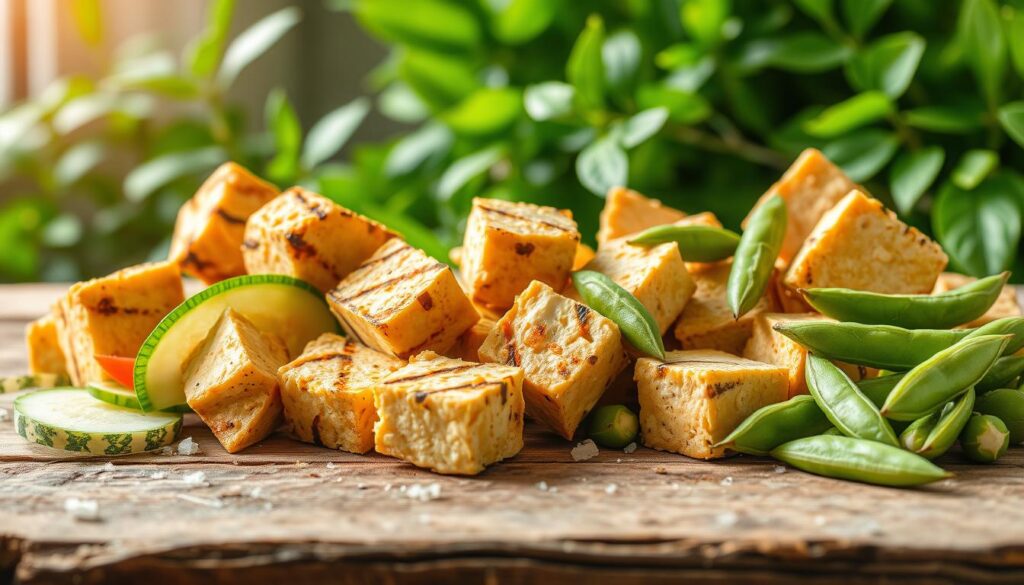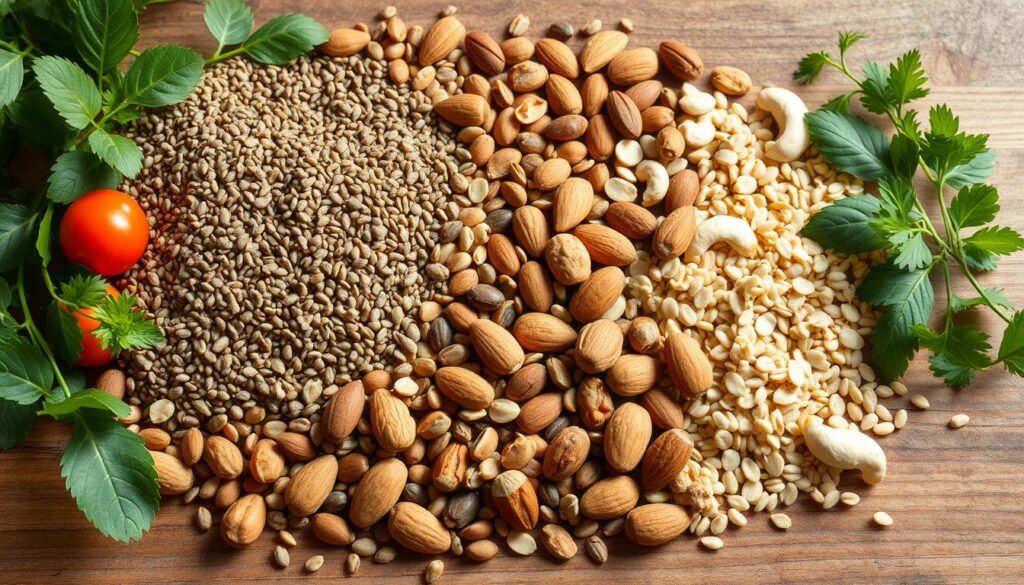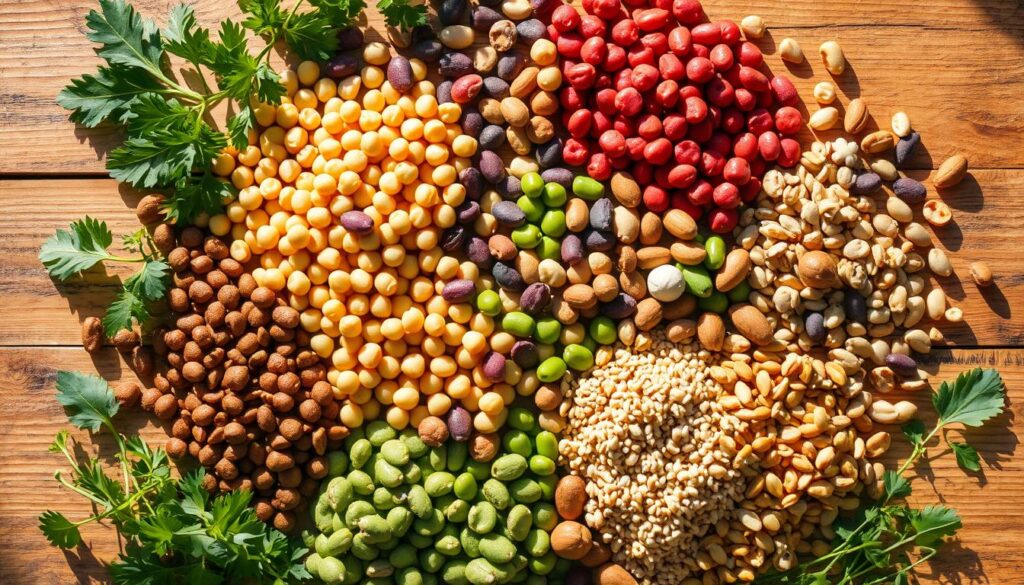If you’re on a plant-based diet, you might wonder how to get enough protein. The good news is that a well-planned vegan or vegetarian diet can give you plenty of high-quality protein. This supports your health and fitness goals.
From nutrient-dense legumes to ancient grains and versatile soy-based foods, plants have many protein sources. These can help you build and keep muscle while enjoying the health benefits of a plant-based lifestyle.
Key Takeaways
- A plant-based diet can provide sufficient protein to support your health and fitness goals.
- Choosing the right high-protein plant foods is crucial to ensure a balanced nutrient intake.
- Legumes, ancient grains, soy-based products, and seeds/nuts are excellent sources of plant-based protein.
- Incorporating a variety of protein-rich plant foods into your diet can help you meet your daily protein requirements.
- A plant-based diet can offer additional health benefits, such as reduced risk of chronic diseases and improved weight management.
Understanding Plant-Based Protein Fundamentals
Plant-based proteins are key for vegetarian muscle gain and plant-based bodybuilding. Not all plant proteins are the same. Knowing the differences helps you get enough protein and reach your fitness goals.
Complete vs. Incomplete Protein Sources
Animal products have complete proteins with all essential amino acids. But, many plant proteins are incomplete, missing some amino acids. You can mix different plant proteins, like rice and legumes, to get all the amino acids you need.
Daily Protein Requirements for Plant-Based Diets
Adults need about 0.8 grams of protein for every kilogram of body weight. For a 140-pound person, that’s about 50 grams of protein daily. Vegetarians and vegans usually eat 70% more protein than needed. Non-vegetarians eat almost 80 grams.
Benefits of Plant Protein Over Animal Protein
Plant proteins are better than animal proteins in many ways. They have less saturated fat, more fiber, and more nutrients. Eating too much animal protein can lead to heart disease, diabetes, and low testosterone. Switching to plant-based proteins can lower these risks and improve your health.
Learning about plant-based proteins helps you find many high-protein options. You can add them to your diet to support your fitness goals and health.
Seitan: The Ultimate Wheat-Based Protein Source
If you love working out and eat plants, seitan is for you. It’s called wheat meat or wheat gluten. It’s packed with seitan protein that’s as good as some animal proteins.
Seitan has a lot of protein. A 2-ounce serving has 17 grams of protein. That’s as much as in a 2-ounce chicken breast. It’s perfect for plant-based bodybuilding and building muscles.
| Nutrient | Amount per 2 oz (57g) of Seitan |
|---|---|
| Calories | 100 |
| Protein | 17 g |
| Fat | 0.5 g |
| Carbohydrates | 6 g |
| Fiber | 1 g |
| Iron | 1.5 mg (8% DV) |
| Sodium | 440 mg (19% DV) |
Seitan is also low in calories, fat, and carbs. It’s great for a plant-based diet. Plus, it has iron, calcium, and B vitamins for extra nutrition.
But, seitan isn’t a complete protein. It misses some amino acids found in soy products. To get all amino acids, eat seitan with other plant proteins or foods.
Seitan is also super versatile in cooking. It tastes like meat and works well in many dishes. You can grill, sauté, or add it to stews and casseroles. It’s a tasty, plant-based choice for your meals.
Be careful with the ingredients and how seitan is made. Store-bought seitan might have extra fat, salt, and sugar. Always check labels and choose simple, homemade seitan. This way, you get the most nutrition from your plant-based protein.
Legumes and Beans for Plant Based Diet High Protein
If you’re on a plant-based diet and want more protein, legumes and beans are great. They’re full of plant-based protein and other important nutrients. They also have many health benefits.
Lentils: A Protein Powerhouse
Lentils are a big protein powerhouse among legumes. A cooked cup of lentils has about 18 grams of protein. They’re also full of fiber, folate, and minerals, which are good for your health.
Variety of Beans and Their Protein Content
Beans come in many types, each with a lot of protein. Kidney, black, or pinto beans all have about 15 grams of protein in a cooked cup. Eating different beans can make your meals interesting and give you lots of nutrients.
Chickpeas and Their Versatility
Chickpeas, or garbanzo beans, are also great for protein. A half-cup of cooked chickpeas has about 7.5 grams of protein. They’re also good for you because they have complex carbs, fiber, and vitamins and minerals. You can use them in salads, curries, and roasted snacks.
Adding different legumes for protein to your plant-based diet high in protein can really help. It can make your diet more nutritious and support your health and wellness.
Soy-Based Protein Champions: Tofu, Tempeh, and Edamame
Soy-based products like tofu, tempeh, and edamame are top picks for plant-based protein. They are not just high in soy-based protein. They also bring many health benefits to a vegan protein sources diet.
Tofu has been a favorite in Asian cooking for over 2,000 years. It’s a soy-based protein with 10-15 grams of protein in every 3.5-ounce serving. Its mild taste makes it great for many dishes, from stir-fries to desserts.
Tempeh, a fermented soybean food from Indonesia, is another protein powerhouse. It has 17 grams of protein in half a cup. It’s also packed with probiotics and B vitamins, adding to its health benefits.
Edamame, young soybeans, are a tasty snack or ingredient. They have almost 10 grams of protein in half a cup. They’re also full of fiber and vitamins and minerals, making them a great choice for a plant-based diet.
| Soy-Based Protein Source | Protein Content per Serving |
|---|---|
| Tofu (3.5 oz) | 10-15 grams |
| Tempeh (0.5 cup) | 17 grams |
| Edamame (0.5 cup) | 10 grams |
These soy-based proteins are not just packed with nutrients. They’re also super versatile. You can use them in stir-fries, salads, baked goods, and even desserts. The options are endless for adding tofu, tempeh, and edamame to your meals.

“Soy consumption appears to help lower men’s risk of prostate cancer, according to a 2018 study.”
If you want to boost your soy-based protein or try new vegan protein sources, these soy-based foods are a great choice. They’re sure to be a hit in your kitchen.
Ancient Grains as Protein Sources
If you’re on a plant-based diet and want more protein, try ancient grains. They’re full of nutrients and offer a lot of health benefits. Let’s look at some top ancient grains for a high-protein diet.
Quinoa: The Complete Protein Grain
Quinoa is a superfood for a reason. It has all nine amino acids our bodies need. A cup of cooked quinoa has 8 grams of protein. The United Nations named 2013 the “International Year of Quinoa” for its global health benefits.
Amaranth and Teff Benefits
Amaranth and teff are also high in protein. A cup of cooked amaranth has about 9 grams of protein. Teff gives you around 10 grams of protein per cup. They’re also full of fiber and minerals, great for a plant based diet high protein.
Spelt and Other Protein-Rich Grains
Spelt, a wheat relative, is also protein-rich. A cup of cooked spelt has 10.5 grams of protein. Kamut and teff also have lots of protein, from 10 to 11 grams per cup. These grains are not just for protein; they also have complex carbs, fiber, and vitamins.
Adding these grains to your plant based diet high protein can help you get enough protein. Quinoa, teff, and spelt are tasty and nutritious ways to boost your protein on a plant-based diet.
Seeds and Nuts for Protein Enhancement
If you eat plants, seeds and nuts are great for protein. They help with fitness and building muscle. These foods are full of good stuff for your health.
Here are some top seeds and nuts for more plant-based protein:
- Hemp Seeds: These tiny seeds have 9 grams of protein in 3 tablespoons. They also have good fats.
- Chia Seeds: Chia seeds have 5 grams of protein in 2 tablespoons. They’re good for smoothies and baked goods. They also have fiber and omega-3s.
- Sunflower Seeds: Sunflower seeds have 7 grams of protein in a quarter-cup. They’re great for snacks or on salads.
Nuts are also great for protein. Try adding these to your diet:
| Nut | Protein per 1/4 Cup Serving |
|---|---|
| Peanuts | 9.5g |
| Pumpkin Seeds | 10g |
| Almonds | 7g |
| Pistachios | 6g |
| Cashews | 5g |
Seeds and nuts are easy to add to many meals. They’re perfect for workouts or just to get more protein. These foods are full of nutrients.

“Nuts and seeds are powerhouses of plant-based protein, providing a range of essential amino acids to support muscle growth and recovery.”
Green Protein Sources: Peas, Broccoli, and Spinach
Green veggies are great for a plant-based diet. They add protein and lots of other good stuff. This helps keep you healthy.
Nutritional Benefits Beyond Protein
Green peas are full of protein, with almost 9 grams per cup. They also have fiber, vitamins, and minerals. Broccoli and spinach have less protein but lots of vitamins A, C, and K. They also have folate and calcium.
Best Preparation Methods
These veggies are easy to use in many ways. Try steaming, roasting, or adding them to salads and stir-fries. This makes it easy to eat more of them.
| Vegetable | Protein per Cooked Cup | Protein Percentage of Calories |
|---|---|---|
| Green Peas | 8.0 grams | 25% |
| Spinach (Cooked) | 5.3 grams | 50% |
| Broccoli (Cooked) | 2.6 grams | 33% |
Adding these veggies to your diet boosts protein and gives you more nutrients. This helps keep you healthy and happy.
“Eating a variety of plant-based, protein-rich foods can help you meet your daily protein needs while also providing a wealth of other essential nutrients.”
Nutritional Yeast and Spirulina as Protein Supplements
For those on a plant-based diet, nutritional yeast and spirulina are great. They add protein to your vegan recipes and help with bodybuilding. Nutritional yeast has 8 grams of protein in half an ounce. It also has lots of B vitamins, which vegans often miss.
Spirulina, a blue-green algae, also has 8 grams of protein in 2 tablespoons. It’s full of iron, copper, and vitamins. Adding it to meals makes them healthier and more protein-rich.
These supplements are good for building muscle or losing weight. They help meet your daily protein needs. Your body and taste buds will love them!


A Life-Changing Experience with This Weight Loss Supplement (Nagano Tonic)
I’ve always struggled with finding a weight loss solution that actually works for me. Like many, I’ve tried numerous diets, exercise routines, and supplements over the years—some worked for a short time, but nothing ever gave me long-term results. That was until I decided to try the weight loss supplement I found : Link to the Supplement.
From the moment I started using it, I noticed a difference. Not only did I feel more energized, but my cravings also became more manageable. The best part? I started seeing results much quicker than I anticipated! Over the course of just a few weeks, I noticed a significant reduction in belly fat and overall weight loss that I hadn’t been able to achieve before.
What makes this supplement stand out from all the others I’ve tried is how it supports me in my daily routine without any jitters or energy crashes. I’m able to stay focused and motivated, which has made it easier to stay on track with my diet and exercise plan.
This product truly exceeded my expectations, and I feel more confident and healthier than ever before. If you’re struggling with your weight loss journey like I was, I highly recommend giving this supplement a try. It’s been a game-changer for me, and I’m sure it can work wonders for you too!
Contant Them on email .. tonicnagano50@gmail.com
I’ve tried so many weight loss products over the years, but nothing worked like this supplement! Since I started using it, I’ve noticed a big difference in my energy levels and appetite control. In just a few weeks, I’ve lost weight and feel so much better. It’s been easy to stick with, and the results speak for themselves. Highly recommend this to anyone looking to make a real change!
wasn’t sure what to expect, but this weight loss supplement has really impressed me! After just a few weeks of use, I’ve already dropped a few pounds and feel more motivated to stay active. It’s helped curb my cravings and boosted my energy throughout the day. I’m excited to keep going and see even better results. Definitely worth trying!
Reach them on tonicnagano50@gmail.com
I was skeptical at first, but this supplement has truly made a difference in my weight loss journey. I’ve lost weight without feeling deprived or sluggish. My cravings are under control, and I feel more confident in my body. It’s easy to incorporate into my daily routine, and the results speak for themselves. I’m so glad I gave it a try!
Thanks David, i do use the link to make my purchase. you can get too here http://surl.li/iasppy
I’ve tried so many weight loss products, but this one has been by far the most effective. In just a few weeks, I’ve noticed a visible difference in my body and energy levels. It’s helped me stay on track without the constant hunger pangs and cravings. I’m really happy with my progress and can’t wait to see where I’ll be in another month!
This Nagano Tonic has been amazing! In just a few weeks, I’ve lost weight, feel more energized, and my cravings are under control. Highly recommend it!
Thats the link to purchase http://surl.li/iasppy